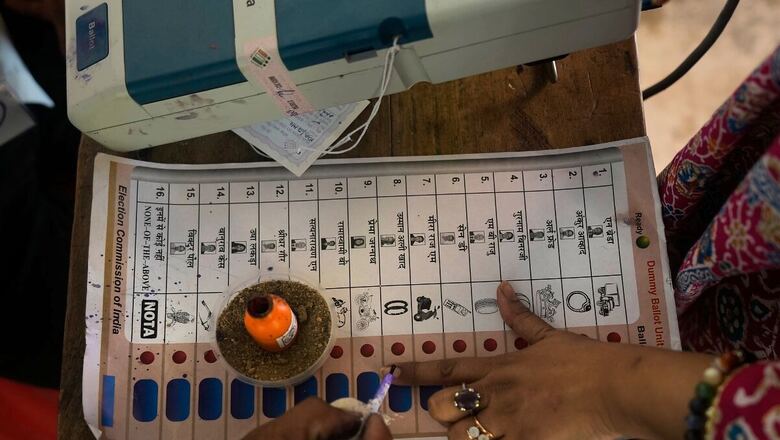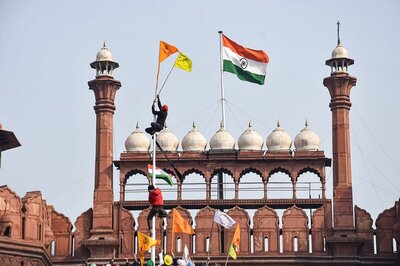
views
With six phases of the 2024 Lok Sabha elections complete, various political parties are putting forward their agenda and narratives, in addition to their manifestoes, through speeches, statements, discussions, and social media posts. One crucial issue, however, remains unspoken by the parties, though the public carefully examines each party’s stance. The core issue is where the parties stand regarding national unity, integrity, and nationalism, as this election is not of any single state but of Lok Sabha i.e. an all-India election.
India, that is Bharat, has been a rashtra i.e. a nation practicing unity in diversity since ancient times. Despite diversities and paradoxes on the basis of varnas and castes, creeds and sects, geographical regions, languages etc., there has always been a cultural unity. Historically speaking, a feeling and consciousness of political unity also evolved during the independence movement, which was later enshrined in the Preamble of the Indian Constitution. The Preamble’s opening words, “We the people of India,” are aimed to ensure the unity and integrity of the nation. In this spirit, the political leadership, army, bureaucracy and people of this country have incessantly worked, barring some exceptions, to protect the unity and integrity of the nation.
In various Lok Sabha elections, the public has generally voted for a strong national leadership, displaying the same pan-India vision and national spirit. But for some time now, regional political satraps have emerged in sundry states. These regional parties have considerable influence and dominance in the politics of their state. The question at hand is, from a national perspective, what should be the attitude of the voters, in the current national election from the viewpoint of national unity, integrity and interest? It would be pertinent to understand, in this context, the character and conduct of various parties.
In the current elections, the Bharatiya Janata Party (BJP) is a dominant party, on one side of the fence. Despite its electoral alliances with some regional parties, as a strong national party, the BJP, along with its allies, is contesting the elections with a pan-India perspective and national spirit. On the other hand, the Congress is in the fray in alliance with various other regional parties. The BJP faces direct competition from the Congress in numerous states. In constituencies where the Congress is not a major factor, the BJP’s primary competition comes from regional parties such as the Samajwadi Party, Trinamool Congress, Rashtriya Janata Dal, Jharkhand Mukti Morcha, and Aam Aadmi Party. Many of these regional parties have existing alliances or an understanding with the Congress. Apart from this, Biju Janata Dal, Akali Dal, BRS etc. are also in the fray.
When considering policy, perspective, and mass base, only the BJP and Congress are widely viewed as national parties. However, according to the rules of the Election Commission, parties like the Bahujan Samaj Party, Communist Party (CPM), and Aam Aadmi Party are also technically classified as national parties. However, their character, conduct, and approach are often perceived as narrow, resembling those of regional parties.
The regional parties, confined usually to a particular state, operate from a narrow perspective instead of a pan-India sentiment and nationalistic outlook. For example, the National Education Policy (NEP) 2020 is appreciated all across and even outside India, but states like Bengal refused to implement it, displaying the vested political interests of regional parties and ignoring the national good. Secondly, most of the regional parties are not only limited to a particular state but their support base is also restricted, usually to a particular caste. For example, the RJD is mainly a party of Yadavs, the BSP is a party of Dalits and among them mainly of Jatavs, the SP is also a party mainly of Yadavs and Lok Dal or INLD are parties of Jats. These caste-based parties, generally, are more concerned regarding the interests of their own castes than those of the larger public.
Another drawback of the regional parties is that most of them are fraught with parivaarvad i.e. controlled by one family. RJD, SP, TMC, DMK, TRS, Akali Dal, Lok Dal, Lok Janshakti Party, INLD, JMM etc. are such parties. Now even the AAP seems to be following in their footsteps. After Arvind Kejriwal went to prison, his wife suddenly became the number two leader in the party. These family-oriented parivaarvadi regional parties promote nepotism and put forth their familial interests above the public good and national interest.
The most dangerous aspect of these regional parties is that their leaders often issue inflammatory statements, spewing hatred against people from other states for the sake of political gains. A glaring example is Mamata Banerjee’s statement alleging that Gujaratis along with “goons” from UP and Bihar are trying to “capture” Bengal. DMK leader Dayanidhi Maran, part of the Congress-led INDIA alliance, made highly objectionable comments claiming that people from UP, Bihar, and other Hindi-speaking regions only clean toilets in Tamil Nadu. Similarly, Sukhpal Khaira, a Congress Lok Sabha candidate in Punjab, courted controversy by stating that people from UP and Bihar should be denied jobs and voting rights in the state. Echoing this sentiment, former Punjab Chief Minister and Congress leader Charanjit Channi declared that “bhaiyas” (a derogatory term for people from UP and Bihar) would be barred from entering Punjab. Even Uddhav Thackeray, currently aligned with the Congress, once advocated for mandatory permits for those migrating to Mumbai from other states.
Such inflammatory rhetoric, intended to bolster regional political agendas, not only demeans people from other states but also directly undermines India’s unity and integrity—principles enshrined in the Constitution’s preamble. These leaders, lacking Prime Minister Modi’s national vision, sow discord among communities and foster an environment hostile to national unity, ultimately compromising the national interest. Today, Bharat is making a mark in the global economic trajectory with a promise to become the third largest economy in the world, by 2027, from the current position of 5th largest economy; however, such hatred and discord will only create obstacles for it.
Considering this scenario, a critical question emerges: How risky is it to rely on regional parties that prioritize narrow caste-based or familial interests over pan-Indian concerns, thereby undermining national unity and integrity? To address this emerging threat, both major national parties, the BJP and the Congress, will need to strengthen their positions in this election. However, the Congress, presently, is like a sinking ship and its relations with allies like the TMC, CPM, and AAP are reportedly strained, according to some political analysts.
In such a situation, the only reliable option that remains is the BJP. It is undeniably a national party with strong leadership, making it a formidable contender in national elections like the Lok Sabha. However, the final decision of the public will only be known on June 4, 2024, when the citizens of the nation will have determined its future.
Prof. Niranjan Kumar is a Senior Professor at the Central Hindi Department, University of Delhi. He tweets @NiranjanKIndia. Views expressed in the above piece are personal and solely those of the author. They do not necessarily reflect News18’s views.




















Comments
0 comment